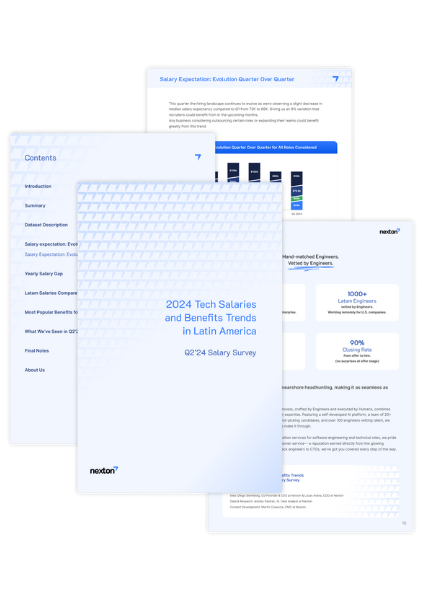The COVID-19 health crisis has completely changed the way we work. According to McKinsey & Company’s study The future of work after COVID-19, companies across the globe are expected to take on more remote workers than ever before. As companies embrace more flexible work environments and realize the benefits of working remotely, demand for talented remote team members will only keep increasing.
As a senior LATAM-based software developer, this move to remote work opens up a lot of opportunities to kickstart an international career. The possibilities are limitless. Now, the decision to get your dream remote job in a US company and achieve the perfect work-life balance is in your hands.
At Nexton, we offer career development to senior developers in Latin America by connecting them with top companies in the US and supporting them throughout the interviewing and hiring process. In this article, we’ll walk you through some of the basics of taking your engineering career beyond borders and show you how to begin your search for the best software developer jobs at top US firms. As your career partners, we are here to bring these opportunities to you regardless of where you are in the world.
How To Start A Remote Developer Career
Your career roadmap as a remote engineer can take many different forms. At Nexton, we find US companies consistently hunt for back-end, front-end, and full stack developers, as well as other technical talents with the right skill set to face the unique challenges that come with working remotely.
But there’s much more to being a developer than just writing code. According to WeLearnCode, US companies prioritize hires that, besides being great coders, are also:
- Great communicators. As a senior developer, your main role is to come up with solutions to your company’s toughest problems. In the absence of face-to-face meetings, strong communication skills are more important than ever before to your career. To learn more about the importance of communication skills for remote engineers, read our article.
- Disciplined. Working from home might sound like a dream come true. However, without the routined structure of office life, many developers find it difficult to manage the flexibility that comes with a remote career. Hence, US companies highly value engineers with the ability to properly manage their time, focus, and motivation.
- Strong team players. As a senior developer, your career depends on your ability to connect with your team members and coworkers. This is even more important when working remotely, where communicating and collaborating are a little more challenging. Click to learn what it takes to be a great remote team member.

As a senior software developer, you know the way around coding. For you, that might be the easy part of the job. The 3 skills we mentioned above are among some of the most important non-coding skills US companies look for when hiring remote developers. Check out this post for a more comprehensive look at what US companies look for in their remote hires.
How To Find and Land The Perfect Remote Engineering Job
Besides honing the right skills to advance both your coding and non-coding skills, the second most important aspect of starting your career as a remote engineer is, of course, the job search.
Remote engineering careers come in many forms; they can be full-time, part-time, contract, or freelance. Knowing what kind of role best suits your needs and work structure can be tricky, and finding the right company to work for can prove even more challenging. At Nexton, we specialize in placing LATAM-based developers in long-term remote-jobs, leveling the playing field for talent across borders.
As you search for the ideal remote developer career, make sure to pay close attention to:
- Company culture. You can’t objectively measure company culture, and remote settings make it even more difficult to analyze whether you’re a good culture fit for a company. To learn more about culture fit, why it’s important, and how to gauge it when applying for remote developer jobs, click here.
- Salary expectations. Remote engineering salaries vary greatly depending on a candidate’s experience and skills, the responsibilities of a particular job, and the geographical location of the hiring company. Make sure to read our post on managing salary expectations to negotiate your remote developer salary with confidence.

Finally, once you’ve found a position with the right culture fit and salary, it’s time to prepare for your interview. Every company goes about the interview process a little differently, and there really is no one-size-fits-all approach to interviewing for a remote developer position. Nonetheless, on our blog, we’ve published several posts designed to help get you prepared for a remote developer interview.
This information will get you started and guide you through the different ways to start your career as an international software developer. We will be here to accompany you through the entire interview and hiring process. Your dream remote job is at your fingertips, contact us to find your dream job today.



